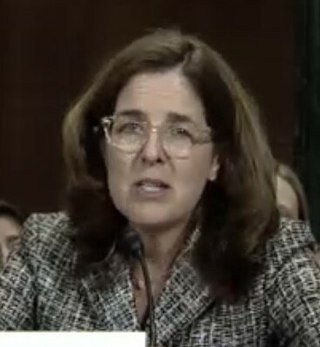Related Research Articles

Tyco International plc was a security systems company incorporated in the Republic of Ireland, with operational headquarters in Princeton, New Jersey, United States. Tyco International was composed of two major business segments: security solutions and fire protection.
Sanjay Kumar is the former chairman and CEO of Computer Associates International, from 2000 until April 2004.

Johnson Controls International plc is an American, Irish-domiciled multinational conglomerate headquartered in Cork, Ireland, that produces fire, HVAC, and security equipment for buildings. As of mid-2019, it employed 105,000 people in around 2,000 locations across six continents. In 2017 it was listed as 389th in the Fortune Global 500. It became ineligible for the Fortune 500 in subsequent years since it relocated its headquarters outside the U.S.
Scott D. Sullivan is the former chief financial officer, secretary, treasurer, and a board member of WorldCom, who was convicted as part of WorldCom's $3.8 billion accounting fraud, at the time the largest scandal of its kind in U.S. history.
Remuneration is the pay or other financial compensation provided in exchange for an employee's services performed. A number of complementary benefits in addition to pay are increasingly popular remuneration mechanisms. Remuneration is one component of reward management. In the UK, it can also refer to the automatic division of profits attributable to members in a Limited Liability Partnership (LLP).
David Wittig is the former chief executive officer of Topeka, Kansas-based Westar Energy, a utility company.
Mid-State Correctional Facility is located in the Town of Marcy, between the cities of Rome and Utica in New York State. From about 1912 through 1982 the state ran a state asylum on these grounds. That institution would grow to hold 3,000 patients. Mid-State opened as a correctional institution, in the extensive former hospital buildings, in 1983.
Warren Van Dyke "Pete" Musser was the chairman of the Musser Group. He was the founder of Safeguard Scientifics, a venture capital firm that invested in technology companies. At the peak of the dot-com bubble, Musser was a billionaire on paper; however, when the bubble burst, he lost almost his entire fortune.

The term clawback or claw back refers to any money or benefits that have been given out, but are required to be returned due to special circumstances or events, such as the monies having been received as the result of a financial crime, or where there is a clawback provision in the executive compensation contract.
Melvyn I. Weiss was an American attorney who co-founded plaintiff class action law firm Milberg Weiss.
Universal Express claimed to be a transportation and logistics service company and was registered in Nevada and headquartered in Boca Raton, Florida. However, investigation by the SEC clearly revealed that the primary business of USXP was the production of and distribution of billions of illegal, unregistered shares. The money from these sales went directly to support the lavish lifestyle of Richard Altomare and his supporters. Some funds were diverted to advertising designed to push the sale of additional shares.
Thomas Poole Griesa was a United States district judge of the United States District Court for the Southern District of New York from 1972 to 2017 and its Chief Judge from 1993 to 2000.
Thomas Trantino is an American convicted murderer who was sentenced to life in prison for the execution style shooting deaths in 1963 of two police officers in Lodi, New Jersey. He was sentenced to death by electrocution, which was commuted to life in prison after capital punishment was suspended in the 1970s. This began a long battle for parole, which continued until his release from prison in 2002.
"Tone at the top" is a term that originated in the field of accounting and is used to describe an organization's general ethical climate, as established by its board of directors, audit committee, and senior management. Having good tone at the top is believed by business ethics experts to help prevent fraud and other unethical practices. The very same idea is expressed in negative terms by the old saying "A fish rots from the head down".

Ann Marie Donnelly is a United States district judge of the United States District Court for the Eastern District of New York.

FrontPoint Partners was a hedge fund that became well known for its bet against subprime mortgages during the 2008 financial crisis under Steve Eisman. It was based in Greenwich, Connecticut, with other offices in New York and London.
Evan Greebel is a convicted felon and the former New York based attorney of Martin Shkreli. Greebel was the outside counsel to Retrophin Inc., which Shkreli co-founded.
Joseph F. "Chip" Skowron III is an American former hedge fund co-portfolio manager of FrontPoint Partners LLC's health care funds. He was convicted of insider trading, for which he served five years in prison. He was also required to repay his hedge fund employer $32 million it had paid him in compensation, because he had been a “faithless servant.”
The faithless servant doctrine is a doctrine under the laws of a number of states in the United States, and most notably New York State law, pursuant to which employees who act unfaithfully towards their employers must forfeit to their employers all compensation received during the period of disloyalty.
References
- ↑ "Dennis Kozlowski.biography". Biography.com. A+E Networks. Retrieved July 31, 2012.
- ↑ Business Week. McGraw-Hill. 2002.
- ↑ Torrado-Caputo, Vanessa; Mazurkiewicz, Margaret (2005). International directory of business biographies. St. James Press. ISBN 978-1-55862-556-3.
- ↑ Ferrell, O. C.; Fraedrich, John; Ferrell, Linda (2008). Business Ethics: Ethical Decision Making and Cases. Cengage Learning. pp. 334–. ISBN 978-0-618-74934-8.
- ↑ Hitt, Michael A.; Ireland, R. Duane; Hoskisson, Robert E. (2009). Strategic Management: Competitiveness and Globalization : Cases. Cengage Learning. pp. 323–. ISBN 978-0-324-58113-3.
- 1 2 Alexandra Clough, Former Tyco chief, Boca Raton con says he’s changed, Palm Beach Post (March 2, 2015).
- 1 2 Mark Maremont & Laurie P. Cohen, Tyco Spent Millions for Benefit of Kozlowski, Its Former CEO, Wall Street Journal (August 7, 2002).
- ↑ ""Judge Declares Kozlowski Mistrial"". Forbes.com. April 2, 2004.
- ↑ ""Tyco Trial II: Verdict First, Law Second"". Forbes.com. June 17, 2005.
- ↑ Grace Wong (September 19, 2005). "Kozlowski gets up to 25 years". CNNMoney.
- ↑ Associated Press, Kozlowski sentenced in Tyco trial. Denver Post , September 19, 2005. Retrieved October 7, 2016.
- 1 2 3 Riley, Charles. "Ex-Tyco CEO Dennis Kozlowski denied parole". CNNMoney. CNN. Retrieved July 31, 2012.
- ↑ Ex-Tyco execs lose appeal at U.S. Supreme Court, Associated Press (June 8, 2009).
- 1 2 3 Kia Makarechi, Dennis Kozlowski Reveals What Happens after You Serve Your White-Collar Prison Sentence, Vanity Fair (March 2015).
- 1 2 3 4 5 6 7 After prison, $167 million in restitution and fines, he's free, New York Times printed in Tampa Bay Times (March 3, 2015).
- ↑ "Ex-Tyco CEO Dennis Kozlowski Released from Prison". CEPRO. January 17, 2014. Archived from the original on February 23, 2017. Retrieved January 21, 2014.
- ↑ Merced, Michael (December 3, 2013). "Kozlowski Is Granted Parole". The New York Times. Retrieved December 4, 2013.
- ↑ Inmate Information » NYS Department of Corrections and Community Supervision. Nysdoccslookup.doccs.ny.gov. Retrieved January 25, 2013.
- 1 2 "The Essential Lessons of the "Faithless Servant"". December 6, 2010.
- ↑ Neal, Catherine S. (January 7, 2014). Taking Down the Lion: The Triumphant Rise and Tragic Fall of Tyco's Dennis Kozlowski. St. Martin's Publishing. ISBN 9781137413574.
- 1 2 Stempel, Jonathan (December 2, 2010). "Ex-Tyco CEO Dennis Kozlowski ordered to forfeit pay". Reuters.
- ↑ "OPINION: Tyco's motion for partial summary judgment is granted as to their first, second, third, eighth, ninth, and eleventh causes of action, and denied as to their fourth, fifth, sixth, seventh, tenth, and twelfth causes of action for Tyco International, et al v. Kozlowski".
- 1 2 Schorn, Daniel (February 11, 2009). "Dennis Kozlowski: Prisoner 05A4820". 60 Minutes. CBS News. Retrieved July 31, 2012.
- ↑ Freifeld, Karen (December 5, 2013). "Ex-Tyco CEO Kozlowski says he stole out of pure greed". Reuters.
- ↑ Kaplan, David A. (March 2015). "Tyco's 'Piggy,' Out of Prison and Living Small". The New York Times.
- ↑ "Top 10 Crooked CEOs: Dennis Kozlowski". Time . June 9, 2009. Archived from the original on June 12, 2009. Retrieved July 29, 2010.
- 1 2 Ex-Tyco chief's wife files for divorce, NBC News (August 16, 2006).
- 1 2 3 Ex-Tyco chief settles divorce, Associated Press (July 17, 2008).
- ↑ Ex-Tyco boss selling island mansion, Associated Press (June 23, 2006).
- ↑ Kozlowski Seeks $23 Million For Nantucket Estate, Wall Street Journal (June 23, 2006).
- ↑ Nancy Dillon, Kozlowski Quits Board of Daughters' College, Daily News (September 25, 2002).